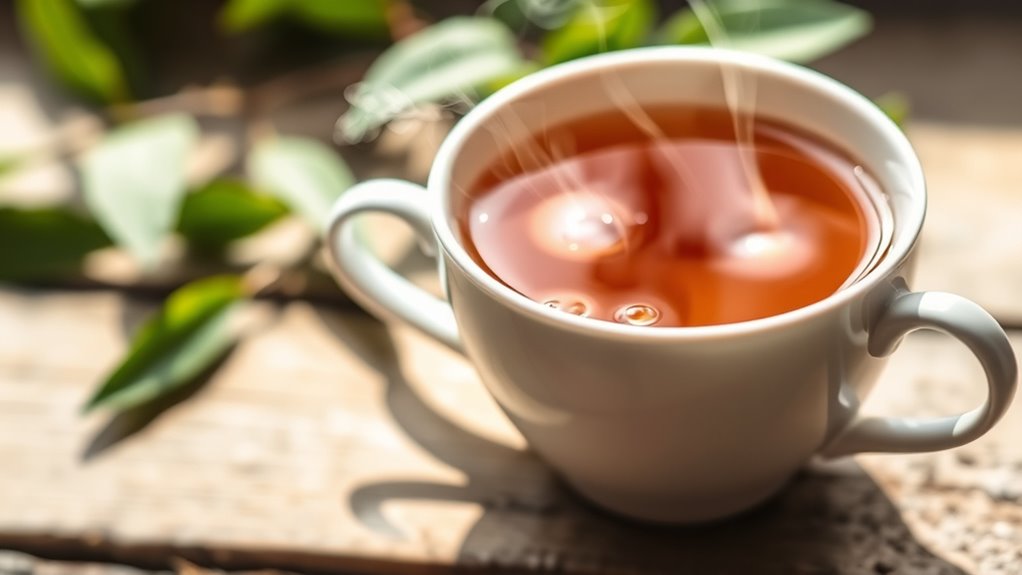Drinking tea regularly boosts your nitric oxide levels by providing antioxidants like catechins and theaflavins, which activate enzymes in your endothelium. These enzymes produce more nitric oxide, helping your blood vessels relax and expand. Improved vasodilation can lower blood pressure and enhance blood flow, supporting your heart health. If you keep exploring, you’ll discover how these effects contribute to long-term cardiovascular benefits and ways to maximize your tea’s impact.
Key Takeaways
- Tea antioxidants activate endothelial nitric oxide synthase (eNOS), increasing nitric oxide production.
- Catechins and theaflavins neutralize free radicals, protecting blood vessel lining.
- Enhanced nitric oxide promotes vasodilation, improving blood flow and lowering blood pressure.
- Regular tea intake supports sustained nitric oxide levels, benefiting overall heart health.
- Tea compounds also reduce LDL cholesterol and blood clot risk, further protecting cardiovascular function.

Tea, especially green and black varieties, has been linked to improved heart health partly because of its ability to boost nitric oxide levels in your body. This connection is rooted in the rich presence of tea antioxidants, compounds that fight oxidative stress and promote vascular health. When you drink tea regularly, these antioxidants work to enhance the production of nitric oxide, a essential molecule that helps your blood vessels relax and expand. This process is fundamental for maintaining healthy blood flow and reducing the risk of cardiovascular issues such as hypertension and atherosclerosis.
Drinking tea boosts nitric oxide, supporting healthy blood flow and heart health.
The antioxidants in tea, particularly catechins in green tea and theaflavins in black tea, play a critical role in supporting your cardiovascular benefits. These compounds neutralize free radicals, which can damage your blood vessels and impair their function. By reducing oxidative stress, tea antioxidants help preserve the integrity of your endothelium—the thin layer of cells lining your blood vessels—allowing nitric oxide to function more efficiently. When nitric oxide levels are optimized, your blood vessels stay flexible, and blood pressure remains within a healthy range, lowering your risk of heart disease.
Consuming tea daily can also stimulate the activity of enzymes involved in nitric oxide synthesis. This means that your body can produce more nitric oxide naturally, further enhancing vascular health. The process is straightforward: the bioactive compounds in tea activate endothelial nitric oxide synthase (eNOS), an enzyme responsible for generating nitric oxide from the amino acid L-arginine. As a result, your blood vessels dilate more easily, improving circulation and reducing the workload on your heart.
Additionally, tea’s cardiovascular benefits extend beyond nitric oxide production. Drinking tea can help lower LDL cholesterol levels and decrease blood clot formation, both of which are risk factors for heart attacks and strokes. The combination of these effects makes tea a simple yet powerful addition to your diet if you’re looking to support your heart health.
Studies also show that tea antioxidants may support ongoing nitric oxide production, further contributing to long-term cardiovascular health.
Frequently Asked Questions
Can Herbal Teas Boost Nitric Oxide Levels Without Caffeine?
You’re curious if herbal teas can boost nitric oxide levels without caffeine. Caffeine-free options, like hibiscus or rooibos, offer great herbal tea benefits without the stimulant. These teas contain antioxidants and phytochemicals that may support healthy nitric oxide production, which is good for your heart. Drinking caffeine-free herbal teas regularly can be a tasty, natural way to enhance your overall health and promote better blood flow.
How Much Tea Should I Drink Daily for Heart Benefits?
To enjoy heart benefits from tea consumption, aim for about 3 to 4 cups daily. This amount provides antioxidants and flavonoids that support cardiovascular health without overdoing caffeine intake. You can choose herbal or green teas for added benefits. Remember, consistency is key, so make tea a regular part of your routine. If you have health concerns, consult your doctor to tailor the right amount for you.
Are There Any Side Effects From Increased Nitric Oxide?
You might wonder about side effects from increased nitric oxide. While it promotes heart health, it can cause potential allergic reactions in some individuals. You could also experience blood pressure fluctuations, especially if you have underlying health conditions or take medications. It’s important to monitor your body’s response and consult your healthcare provider if you notice any unusual symptoms or concerns related to nitric oxide levels.
Does Tea Affect Nitric Oxide Levels Differently for Men and Women?
You might think tea affects everyone the same, but gender differences and hormonal influence make a huge impact. Men and women process tea’s compounds differently, leading to varied nitric oxide levels. Hormones like estrogen can amplify tea’s effects for women, possibly boosting nitric oxide more markedly. So, yes, tea’s impact on nitric oxide isn’t uniform; it’s shaped by gender and hormonal influences, making each person’s response uniquely powerful.
Can Tea Consumption Replace Medication for Heart Health?
You can’t rely solely on tea vs medication to manage heart health. While tea is a natural remedy that may support nitric oxide levels and improve circulation, it shouldn’t replace prescribed medications without your doctor’s guidance. Use tea as a complementary approach, not a substitute. Always consult your healthcare provider before making changes, because effective heart care combines natural remedies with medically approved treatments for the best results.
Conclusion
So, by simply sipping tea, you could be turning into a heart superhero, releasing nitric oxide like a secret weapon against heart disease! It’s almost too good to be true—just one cup could boost your heart’s health more than some fancy medications. So go ahead, indulge in your favorite brew, and let those tiny tea molecules work their magic, transforming your heart’s future into a masterpiece of health and vigor!










